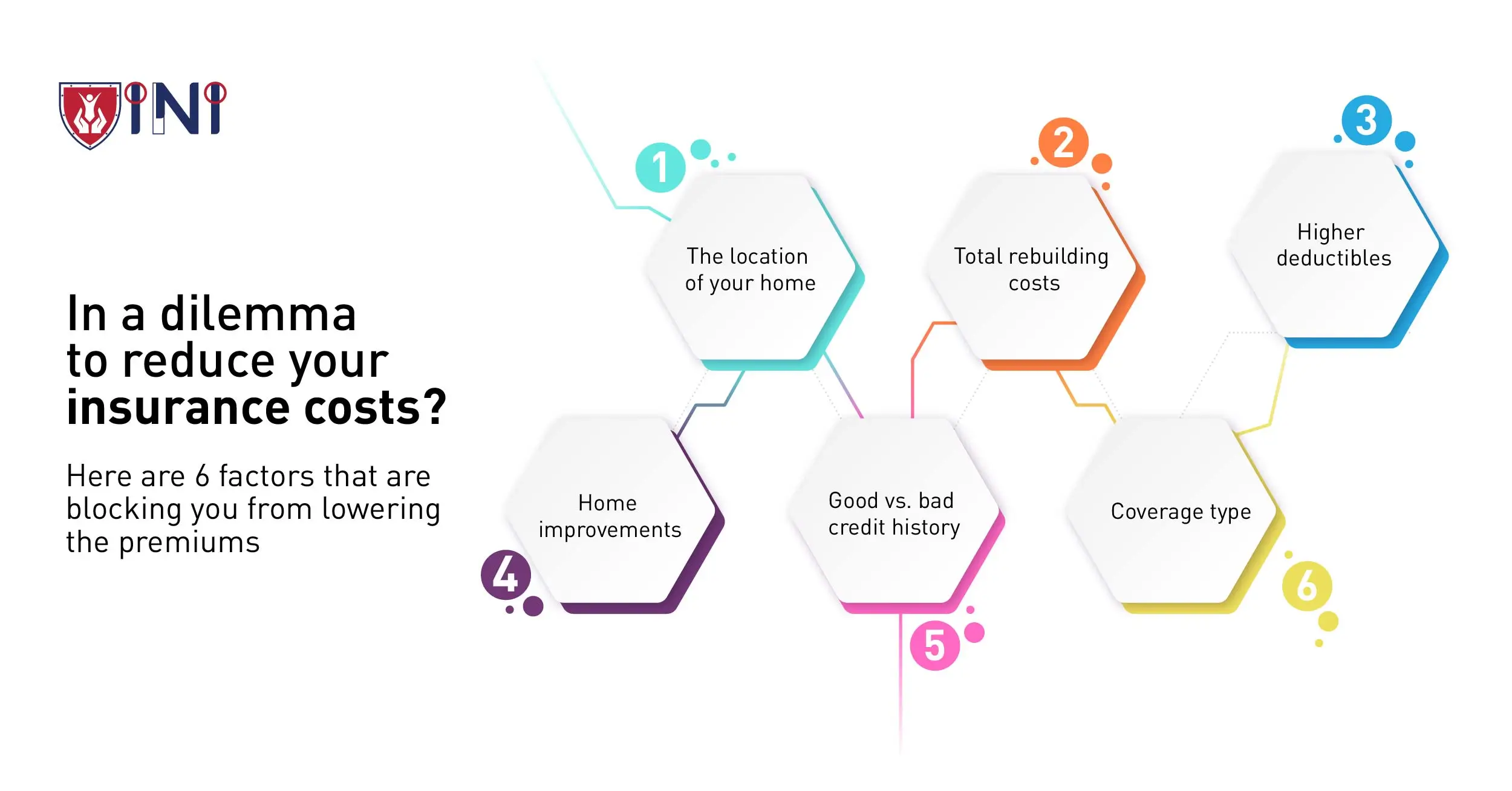13 ways to lower your homeowner's insurance premium?
We know you will do whatever it takes to protect your beautiful home! However, with the rise in homeowners insurance premiums, it is quite challenging to get the coverage you desire.
We have good news!!! There are some practical steps you can take to ease the burden of paying higher premiums without compromising on coverage.
In this blog, we will give you a few tips on how to determine home insurance cost, and 13 ways to lower your homeowner's insurance premium with the cheapest homeowners insurance.
Understanding homeowner’s insurance
Owning a home is one of the largest investments anyone can make in their lifetime, especially if it is a prime location. So protecting the home that you live in with insurance, becomes a necessity.
However, the cost of a homeowner's insurance premium can sometimes feel like an additional mortgage payment and can add up to your monthly expenditure. So, it’s time we understand the real usage of a homeowner’s insurance:
-
Homeowners insurance provides financial protection against unexpected events like natural disasters, theft, or accidents on your property both internal and external.
-
It's not a legal requirement, but if you have a mortgage on your home, lenders might require you to get homeowner’s insurance until the mortgage is paid off.
-
Premiums are a part of homeowners insurance and are influenced by factors such as the location of your home, its age, and even your credit score.
-
But, understanding what influences your premiums is the key to finding ways to lower them. Insurance companies assess the policyholder’s risk and the lower the risk profile you have, the lower your premiums will be.
6 factors affecting homeowners insurance estimate costs

Did you know the average home insurance cost is $1,428 annually? As the premiums are set to rise due to several factors, people are in a dilemma to reduce their costs. Let’s see what kind of factors are the reason behind the rise:
-
Home’s location
-
The geographical location of your home plays an important role in determining your homeowners insurance estimate.
-
Homes in areas prone to natural disasters such as hurricanes, earthquakes, or floods typically have higher premiums due to the increased risk.
-
Additionally, the premium costs are usually higher in urban locations than in suburbs. So, insurers have certain location parameters like
-
The zip code and proximity to fire stations or hydrants. For instance, if your home is less than 100 feet distance from the fire stations/hydrants, you can expect lower rates.
-
The crime rates around your property also influence the premiums, if you’re prone to frequent home break-ins, you can expect higher premiums.
-
-
-
Cost of replacement
-
In case of major damages, insurers need to know how much it takes to rebuild your home. The replacement cost is used to assess just that.
-
Insurers determine these, with the construction costs of similar quality and type of materials used in your home.
-
The market value of your home is different from the cost of replacements and it is based on these factors:
-
Age of your home
-
Square footage
-
Style of architecture
-
Total number of rooms
-
Rebuild costs of other homes in your area
-
-
Therefore, the amount of premiums you will end up paying completely depends on the rebuild costs.
-
-
Deductibles in your policy
-
Deductibles are the out-of-pocket expenses paid by the policyholders before the insurance coverage starts to pay.
-
When the policy deductible is higher, premiums will be lower. If you’re ready to pay for smaller losses by yourself and use the claims only for expensive property damage, you can enjoy lower premiums by opting for a higher deductible.
-
-
Recent home renovations
-
As we discussed home replacement costs, adding up value to your house through renovations and remodeling is also a factor of increased home insurance costs.
-
Home improvement projects such as replacing your roof, renovating the kitchen, or adding up a deck will increase your home’s replacement value.
-
-
Credit history
-
Not just mortgage lenders, insurance companies also assess your credit score and history to determine how much risk can be borne by the policyholder.
-
Ultimately, having a good credit background shows that you are prone to lesser insurance risk compared to those having lower credit.
-
-
Type of coverage
-
The type and amount of coverage you choose significantly influences your homeowners insurance estimates. Common coverage types include:
-
Dwelling coverage - Safeguards the physical structure of your home, including the walls, roof, floors, built-in appliances, and other structural components. It helps cover the costs of repair or reconstruction.
-
Personal property coverage - This coverage extends protection to your personal belongings within the home. This includes furniture, electronics, clothing, and other personal items.
-
Liability coverage - It is a crucial component that protects you financially if someone is injured or property is damaged while on your premises. It also includes the injury caused by your pets.
-
Additional living expense (ALE) coverage - This coverage helps with the additional costs you may incur while living away from your home during the repair or rebuilding process. It is also included in the renter’s insurance policies.
-
-
However, if you want extensive protection, homeowners insurance estimates are higher and it's essential to strike a balance between adequate coverage and affordability.
-
How to determine a homeowners insurance estimate?
When it comes to protecting your home, understanding how to determine your home insurance cost is the first step in securing comprehensive coverage and affordable coverage.
Follow these essential steps to get reliable low cost home insurance:
-
Evaluate your home’s value
-
Begin your house insurance estimate by considering your home’s size, construction materials, and any unique features to assess the current value of your home.
-
Try to identify any cost-effective construction materials that can help you to find the cheapest homeowners insurance. This is because cost-effective construction materials result in lesser replacement costs.
-
-
Calculate the replacement costs
-
As discussed in the previous point, mark the value of all the construction materials and labor costs to calculate the total amount of replacement cost.
-
Pro tip - To get cheap home insurance, you can look for affordable building materials or construction methods.
-
-
Assess personal belongings
-
Document the value of your personal belongings, which are also taken into consideration for calculating the overall home insurance cost.
-
Buying second-hand furniture and electronics will have a positive impact on your home insurance quote.
-

13 ways to find the cheapest homeowners insurance premiums
Finding cheap home insurance involves a strategic approach. If you don’t want to sacrifice essential coverage, follow these easy-to-implement tips:
-
Research and compare
-
Take some time and do your research to obtain house insurance estimates from multiple providers to compare costs.
-
Don’t finalize the first quote you receive, always be on the lookout for the cheapest homeowners insurance available in your locality.
-
-
Bundle your policies
-
Tap into the opportunity of bundling your insurance policies if you’re satisfied with the insurance company’s services. If you have a car, then bundling both your auto and home insurance is an option worth exploring.
-
Bundling can help you save time and money on the premiums you pay. These premiums otherwise cost more when you opt for individual insurance policies.
-
-
Use deductibles mindfully
-
Find the right balance in choosing deductibles that align with your budget. Talk to your insurer and understand how adjusting the deductibles can contribute to securing the affordable homeowner insurance available.
-
-
Maintain Good Credit
-
Understanding the importance of maintaining good credit helps you in getting cheap house insurance rates.
-
In order to improve your lower credit scores, you can make a few changes to your financial habits like making timely payments on credit card bills and paying off higher-interest debts.
-
Having a mix of credit types such as credit cards and installment loans can also have a positive impact on your credit.
-
-
Review and adjust your coverage
-
Regular reviews matter as the value of your home changes with the market fluctuations. Reviews ensure that your coverage aligns with the current replacement cost of your property.
-
Your coverage might change based on your lifestyle. Major life events, such as marriage, the birth of a child, or retirement, can impact your insurance needs.
-
The introduction of newer homeowners insurance policies may present opportunities to optimize your house insurance estimate.
-
-
Consider implementing smart technology
-
With the upgradation of newer technology, homeowners can enhance their home security. Installing state of art security systems positively impacts your home insurance cost.
-
Not only that, these upgrades also help you get cheap home insurance with potential discounts.
-
-
Pay full upfront to save costs
-
Eliminating the monthly premium payment can also help you find the cheapest homeowner’s insurance.
-
Making an annual premium payment negates the need for monthly processing fees and helps you access discounts.
-
-
Install fire prevention measures
-
Enhancing fire prevention measures, with the installation of fire-resistant roofing or siding, can lower the risk of fire-related claims, leading to reduced premiums.
-
-
Go for professional assistance
-
If you find it challenging to search for the cheapest homeowner’s insurance, consult with insurance professionals who can help you look for coverage options and find the most cost-effective homeowner’s insurance policy for your needs.
-
You can find reliable low-cost home insurance plans at Indemnity National Insurance! We help you find the right policy based on your affordability.
-
-
Maintain a good claims history
-
A history of past claims doesn’t really affect your home insurance but a record of no claims establishes a sense of financial responsibility and can lead to premium discounts.
-
-
Consider the condition of your home
-
Regular home maintenance is important as it reduces the risk of frequent damage or loss.
-
If you’re able to do it yourself, great! If not, you can go for home maintenance services to improve the look and feel of your home. Regular home quality check ups can have a positive impact on lowering your insurance premiums.
-
-
Avoid filing small claims
-
Don’t file claims for smaller damages and consider paying for them out of pocket instead of filing a claim. Frequent claims can lead to higher premiums.
-
-
Don’t miss out on discounts
-
Inquire with your insurance provider about available discounts. Some insurance companies offer discounts for non-smokers, retirees, or for homes with certain features such as impact-resistant roofing or energy-efficient upgrades.
-
Implementing these strategies will help homeowners find the right balance between affordability and coverage. Take advantage of these approaches and you will find the cheapest homeowners insurance rates available in the market.
Key takeaways
Securing the right homeowners insurance is paramount when it comes to protecting your homes. As every homeowner goes through the tedious process of finding a beautiful home, it is equally important to focus on getting the right homeowners insurance.
Avoid getting the cheapest homeowners insurance as they might not provide the adequate coverage that you desire. If you would like to gain clarity and knowledge about home insurance, head over to our blogs!
Did you find this article helpful? Share it!







